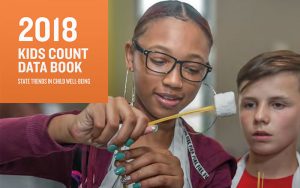A graduate student at the University of South Carolina’s clinical-community psychology doctoral program, Van Phan wrote this column during his tenure as research assistant at Children’s Trust, where he assisted with data, research, and evaluation.
Every summer the KIDS COUNT project of the Annie E. Casey Foundation releases its state rankings on child well-being based on domains of economy, education, health, and family and community stability.

This year South Carolina ranked No. 38, the state’s highest ranking in the history of the KIDS COUNT Data Book. Looking back, we jumped forward a single spot from our No. 39 ranking last year and continued to inch away from the mid-40s, where we floated for the last three decades.
Progress is progress, and if we continue this trend, in just a few more decades, perhaps we could find ourselves in the 20s, or even the teens.
Before that happens, however, we must recognize where we stand and how to best move forward from here. While improvement should be celebrated, being No. 38 means that we still have a long way to go for South Carolina to be one of the best states for children and their well-being.
Taking a closer look at the data, we have remained largely the same over the previous year across most indicators, making slight improvements in a few, but also falling behind on others.
The state’s biggest improvement, from No. 30 to No. 19, came in the percentage of children where the household head lacks a high school diploma. However, when looking at the actual percentage, it has remained steady at 12 percent. Rather than signify an improvement for South Carolina, this is more likely a sign of other states falling behind.
The most significant negative change for South Carolina has come in fourth-grade reading achievements, falling 12 spots from No. 35 to No. 47. The state has also fallen a single spot in eighth-grade math achievements from No. 41 to No. 42. These results are surprising considering the biggest improvement for South Carolina, as noted previously, is the percentage of children where the household head lacks a high school diploma. This could mean there are more indicators outside of education that are impacting children’s performance in school.
Regarding economic indicators, South Carolina has fallen four places, from No. 20 to No. 24, for teens ages 16 to 19 not attending school and not working. We’ve also dropped three spots, No. 20 to No. 23, for children in households that spend more than 30 percent of their income on housing. Interestingly, when looking at the actual numbers, South Carolina has improved in these areas, going from 11 percent to 10 percent (30,000 to 27,000) for teens not attending school and not working, and 29 percent to 28 percent (321,000 to 311,000) for children in households that spend more than 30 percent of their income on housing. This could be a sign that other states are simply improving at a faster rate.
Regarding health indicators, they have remained largely the same with the exception of children without health insurance, where we have fallen five spots from No. 16 to No. 21. When looking at the percentages, however, that particular indicator has remained steady at four percent. While this is good in that we have not gotten any worse, other states have shown improvement when we have not.
Taking another look at the family and community indicators, the biggest decrease has been for children in single-parent households, where we have fallen from No. 43 to No. 47.
Overall, not much changed from the 2017 Data Book. The biggest changes appear to be contingent on the gains and losses experienced in other states. As these changes can be quite variable from year-to-year, it is necessary to focus on what we can do here in South Carolina and remember what is most important – child well-being.
As long as we constantly work to increase our gains, however slowly, in the 16 indicators across the four domains, we should see consistent progress in overall child well-being. As a secondary outcome, our ranking should also improve.
Most importantly, individuals, organizations, governmental agencies and communities serving children and families across South Carolina must continue to work together to ensure our steady momentum continues.
Children’s Trust serves as the home to the Annie E. Casey Foundation’s KIDS COUNT project in South Carolina.






